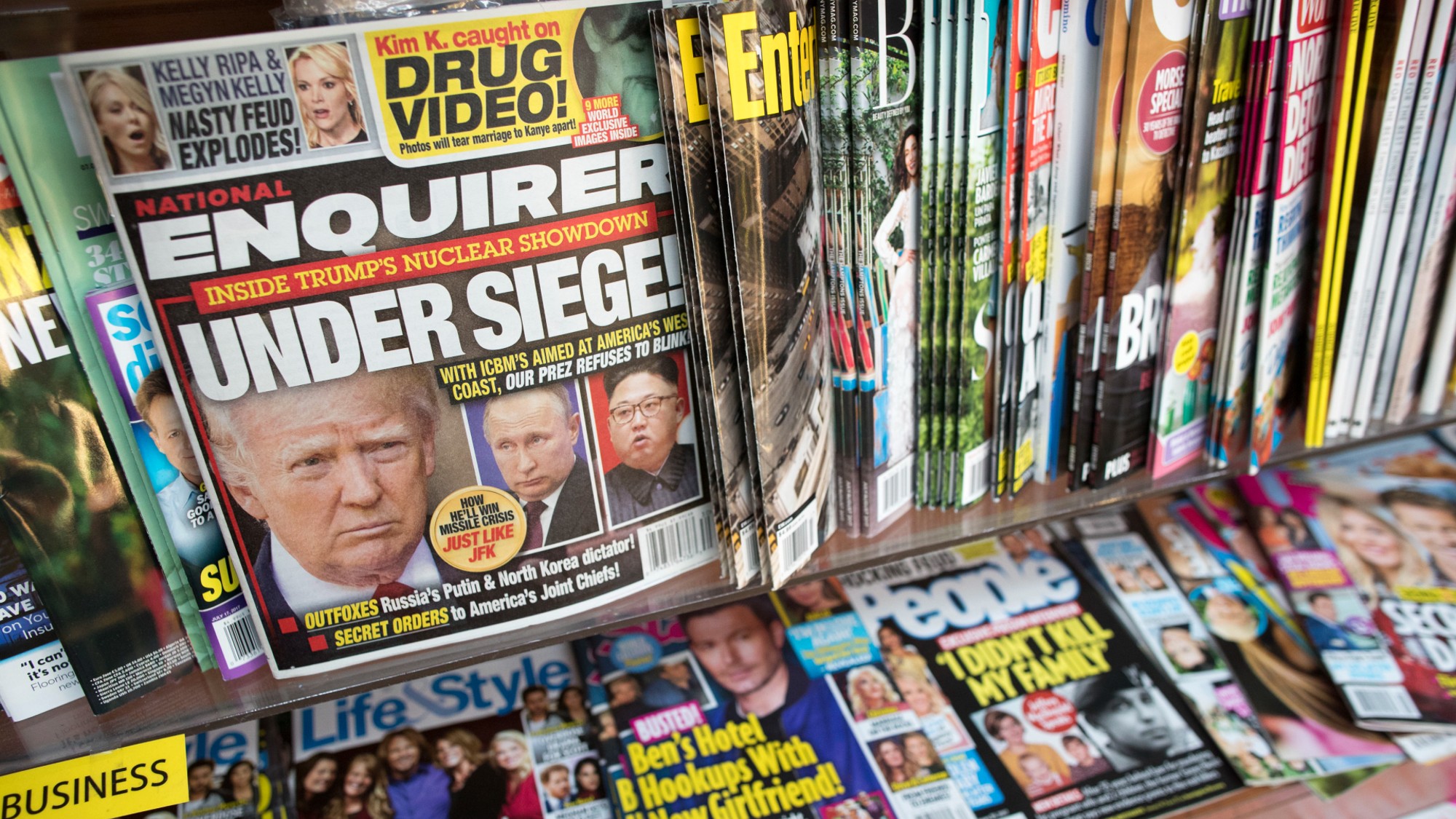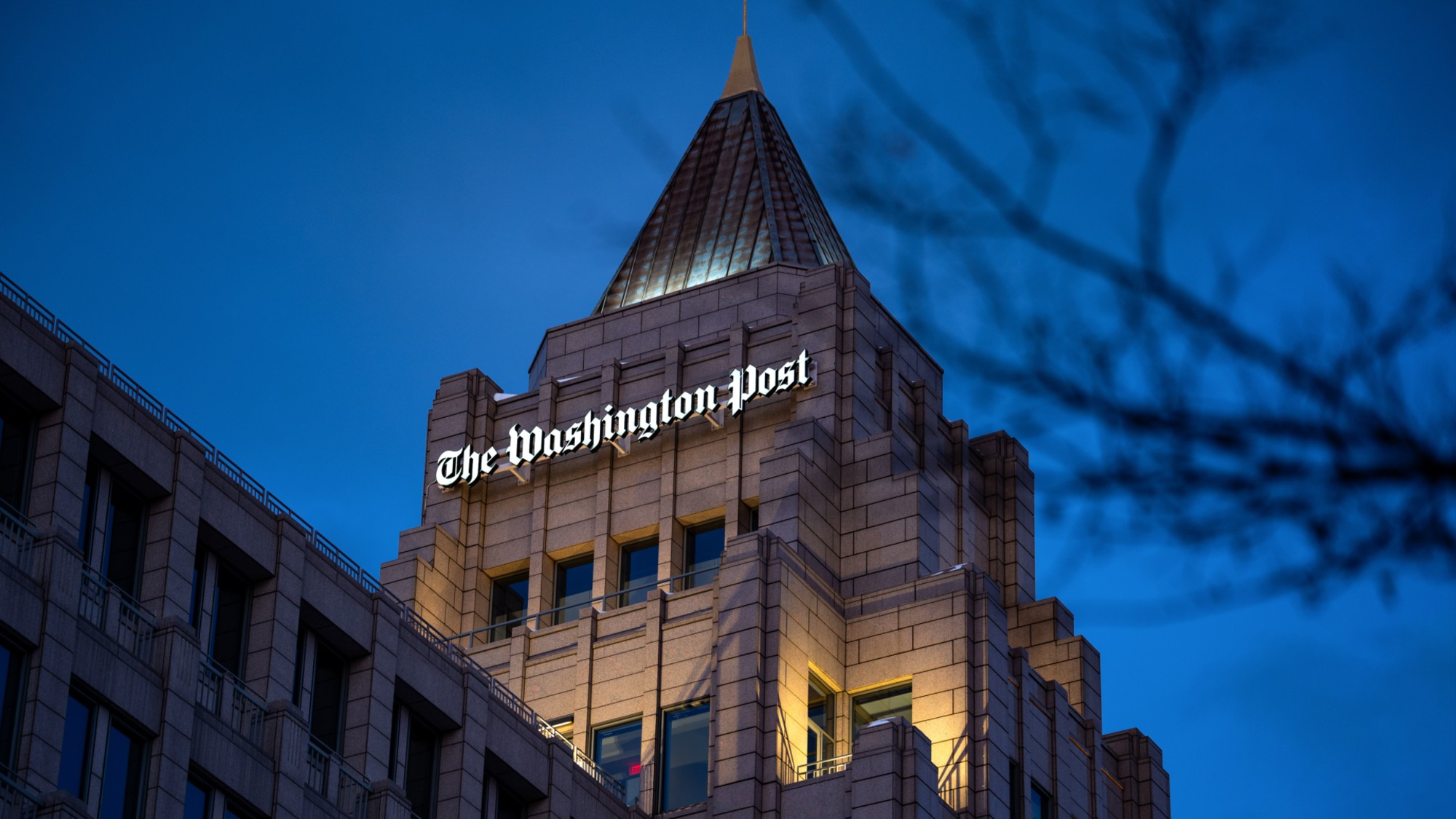The secretive practice of 'catch-and-kill' tabloid journalism
Outlets such as the National Enquirer have become infamous for using the practice


A free daily email with the biggest news stories of the day – and the best features from TheWeek.com
You are now subscribed
Your newsletter sign-up was successful
The New York criminal trial of former President Donald Trump is well underway, and recent testimony has shined a spotlight on an often-maligned practice of journalism: "catch-and-kill." The practice, while having been used for years, has seen a resurgence in the headlines after testimony in the Trump trial by David Pecker, the former publisher of the tabloid newspaper the National Enquirer.
While generally looked down upon by reporters at major news organizations, catch-and-kill journalism — and the overall practice of paying sources for stories — remains commonplace in the tabloid world. How does this practice work, why is it controversial and why is it at the heart of the Trump trial?
What is catch-and-kill journalism?
It is the practice of "buying the exclusive rights to stories, or 'catching' them, for the specific purpose of ensuring the information never becomes public" by halting the story's publication, otherwise known as "killing" it, The New York Times said. This technique is typically used by supermarket tabloids such as the aforementioned National Enquirer and Star.
The Week
Escape your echo chamber. Get the facts behind the news, plus analysis from multiple perspectives.

Sign up for The Week's Free Newsletters
From our morning news briefing to a weekly Good News Newsletter, get the best of The Week delivered directly to your inbox.
From our morning news briefing to a weekly Good News Newsletter, get the best of The Week delivered directly to your inbox.
Paying for sources is not generally allowed by mainstream news organizations in the U.S. Reporters at The Washington Post "cannot accept payment from any person, company or organization that he or she covers," according to the Post's editorial standards, while the Society of Professional Journalists says that paying sources "undermines journalistic independence and integrity and threatens the accuracy of the information that is purchased." However, in the world of tabloids, ethics are often blurry and "deciding what to publish and why is often a calculus that covers favors doled out and chits called in," the Times said.
What are some notable examples of catch-and-kill?
When reports of catch-and-kill instances do leak, they often dominate the headlines. In 2005, American Media Inc., which owns the National Enquirer, promised to "pay a woman $20,000 to sign a confidentiality agreement about an alleged affair" with then-California gubernatorial candidate Arnold Schwarzenegger, according to the Los Angeles Times.
The woman in question "might have been in a position to embarrass Schwarzenegger in his bid for the governor's office," so American Media signed her to a deal in which she "must disclose to no one but American Media any information about her 'interactions' with Schwarzenegger." The scandal caused a firestorm in the media when it occurred, though Schwarzenegger would eventually be elected governor.
American Media, which is now called A360media, allegedly has a number of dedicated files on "various celebrities containing all of the dirt that they haven't published on someone," reporter Ronan Farrow said to NPR. In 2017, Farrow broke the news in The New Yorker of sexual assault allegations against Hollywood mega producer Harvey Weinstein. A360media often doesn't "publish things because of an arrangement they broker with a powerful person," Farrow said to NPR, as was the case with Weinstein and many others, he alleged.
A free daily email with the biggest news stories of the day – and the best features from TheWeek.com
What does the Trump trial have to do with catch-and-kill?
Many of these tabloid catch-and-kills have involved the former president over the years, and Pecker testified about these instances during Trump's trial. The most notable involved the National Enquirer "purchasing and killing a story about an alleged affair between Trump and former Playboy model Karen McDougal," Rolling Stone said. Pecker testified that he spoke with Trump personally about the alleged affair when he was running for president and "suggested purchasing the story to get it off the market," said Rolling Stone.
"I said we should take this story off the market, and [Trump] said 'let me think about it,' and he said [Trump lawyer] Michael Cohen will call you in a couple of days," Pecker testified in court, per Rolling Stone. American Media eventually paid $150,000 to McDougal, and when the story was killed, she "found that the contract she signed prohibited her from discussing her allegations publicly," said Rolling Stone.
The Wall Street Journal broke the news of the Trump-Enquirer scandal in 2016, just four days before the presidential election. Eight years later, Pecker now admits that catch-and-kill was a common practice of his tabloid. "We used checkbook journalism," Pecker testified during Trump's trial, per CNN, "and we paid for stories." While the Enquirer's use of the practice was an open secret for years, this was the "first time that Pecker has spoken publicly about the secret practice," said CNN.
Justin Klawans has worked as a staff writer at The Week since 2022. He began his career covering local news before joining Newsweek as a breaking news reporter, where he wrote about politics, national and global affairs, business, crime, sports, film, television and other news. Justin has also freelanced for outlets including Collider and United Press International.
-
 Is Andrew’s arrest the end for the monarchy?
Is Andrew’s arrest the end for the monarchy?Today's Big Question The King has distanced the Royal Family from his disgraced brother but a ‘fit of revolutionary disgust’ could still wipe them out
-
 Quiz of The Week: 14 – 20 February
Quiz of The Week: 14 – 20 FebruaryQuiz Have you been paying attention to The Week’s news?
-
 The Week Unwrapped: Do the Freemasons have too much sway in the police force?
The Week Unwrapped: Do the Freemasons have too much sway in the police force?Podcast Plus, what does the growing popularity of prediction markets mean for the future? And why are UK film and TV workers struggling?
-
 Media: Why did Bezos gut ‘The Washington Post’?
Media: Why did Bezos gut ‘The Washington Post’?Feature Possibilities include to curry favor with Trump or to try to end financial losses
-
 Jeff Bezos: cutting the legs off The Washington Post
Jeff Bezos: cutting the legs off The Washington PostIn the Spotlight A stalwart of American journalism is a shadow of itself after swingeing cuts by its billionaire owner
-
 The Washington Post is reshaping its newsroom by laying off hundreds
The Washington Post is reshaping its newsroom by laying off hundredsIn the Spotlight More than 300 journalists were reportedly let go
-
 Why is the Pentagon taking over the military’s independent newspaper?
Why is the Pentagon taking over the military’s independent newspaper?Today’s Big Question Stars and Stripes is published by the Defense Department but is editorially independent
-
 ‘Netflix needs to not just swallow HBO but also emulate it’
‘Netflix needs to not just swallow HBO but also emulate it’instant opinion Opinion, comment and editorials of the day
-
 Paramount fights Netflix for Warner as Trump hovers
Paramount fights Netflix for Warner as Trump hoversSpeed Read Paramount Skydance is seeking to undo Netflix’s purchase of Warner Bros. Discovery
-
 Paramount, Comcast, Netflix bid for WBD
Paramount, Comcast, Netflix bid for WBDSpeed Read The outcome of this bidding war ‘could alter the trajectory of the entertainment business’
-
 How Bari Weiss could change CBS News
How Bari Weiss could change CBS NewsTalking Points Is the network trying to ‘appease’ the president?
